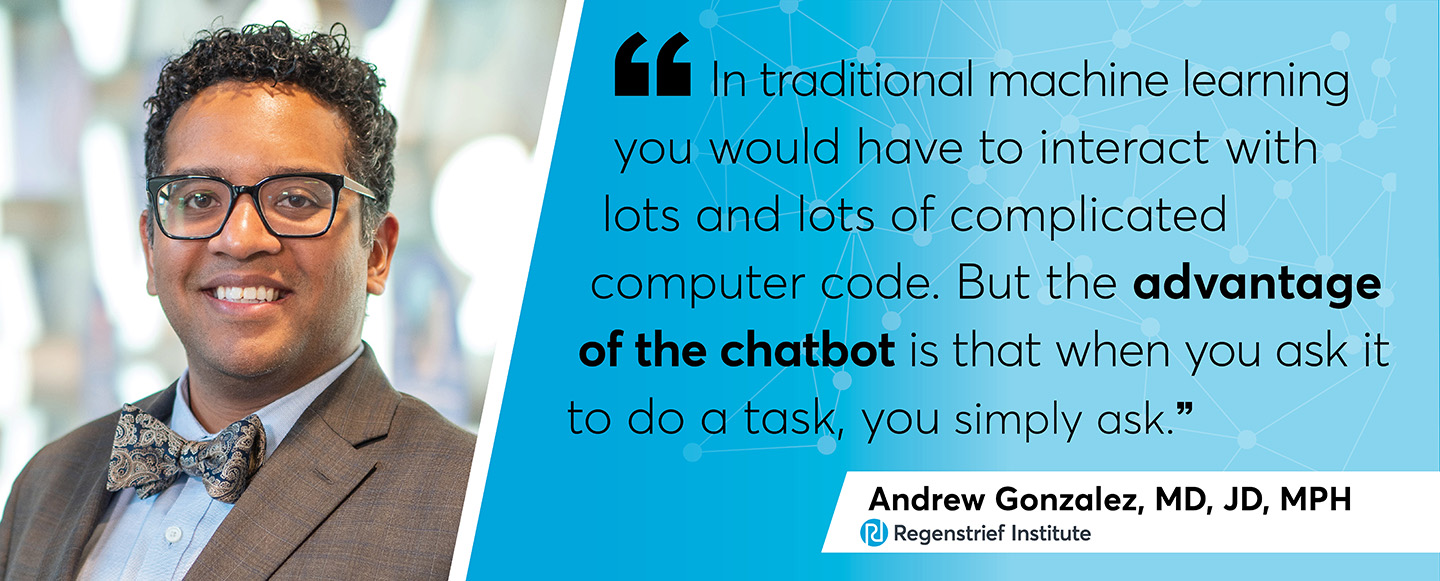Regenstrief researcher developing AI methodology to identify asymptomatic patients with leading cause of limb amputation
INDIANAPOLIS – Andrew Gonzalez, M.D., J.D., MPH, of Regenstrief Institute and the Indiana University School of Medicine, has been named a National Academy of Medicine Scholar in Diagnostic Excellence for 2024. He is one of 11 individuals nationwide selected for this prestigious mid-career program based on the quality and feasibility of research proposals to improve diagnosis and reduce diagnostic errors at the national level.
As a Diagnostic Excellence Scholar, Dr. Gonzalez proposes to develop and test a method of identifying asymptomatic patients with peripheral arterial disease (PAD) – the narrowing of the peripheral arteries carrying blood from the heart to other parts of the body. PAD is the leading cause of limb amputations in the U.S.
Despite affecting 8.5 million Americans and more than 200 million people globally, there are significant gaps in awareness of this disease by both clinicians and patients. Preventing unnecessary amputation requires early and accurate diagnosis, however significant clinical and system challenges contribute to late diagnosis and the misdiagnosis of PAD.
“Throughout the course of human history, until the 21st century, diagnosis was performed solely by clinicians or other type of human,” said Dr. Gonzalez. “Now we have advanced computational abilities — artificial intelligence and other advances in computer hardware and software technology — that allow us to have completely autonomous diagnosis and treatment recommendations, which support ‘enhanced’ clinician diagnosis.”
In his National Academy of Medicine proof of concept project, he will create a chatbot that allows clinicians to interact with patient data in real time, in a dynamic fashion, assisting in the identification of PAD in asymptomatic individuals.
“Just like we’re all familiar with the bank’s or movie theater’s chatbot, our PAD chatbot – pretrained on a certain amount of data that allows it to essentially understand plain English – will be in the background accessible to the clinician. The patient’s data is loaded into it for the chatbot to search and retrieve,” said Dr. Gonzalez. “It’s a huge advantage compared to traditional methods of employing machine learning based systems. In traditional machine learning you would have to interact with lots and lots of complicated computer code. But the advantage of the chatbot is that when you ask it to do a task, you simply just ask.”
To identify asymptomatic individuals with PAD, Dr. Gonzalez will incorporate a digital health information platform based on fine-tuning a large language model to the disease, providing clinicians with “the right information at the right time” to make critical decisions, building clinician trust via a hybrid AI-enhanced clinical decision support system delivered via the chatbot.
Dr. Gonzalez and his research team will assess the project’s accuracy and safety. They will also evaluate disease identification performance for key demographic groups by race, age and gender.
“Peripheral arterial disease is something that I as a vascular surgeon treat on a daily basis,” he said. “I work primarily at Eskenazi Health, a county-based hospital of last resort. We have a high prevalence of patients who have a variety of social determinants of health that interact with their medical conditions, resulting in very extensive and advanced disease. Its incidence is on the rise because people live longer through advanced therapies. And due to increasing rates of obesity and diabetes, people are developing peripheral arterial disease earlier than they used to in the past. It is one of those chronic diseases that we have to figure out ways of allowing people to minimize symptoms without leading to a cure, as one would with appendicitis or with many cancers.”
The National Academy of Medicine Scholars in Diagnostic Excellence were selected, in part, based on their demonstration of leadership in the field and the potential to advance diagnostic excellence and equity. The program is funded by the Gordon and Betty Moore Foundation, in partnership with the Council of Medical Specialty Societies. It offers a one-year, part-time experience for exceptional professionals to advance their diagnostic skills, make significant contributions to improve clinical diagnosis at the national level and accelerate their career development as national leaders in the field.
Andrew Gonzalez, M.D., J.D., MPH
In addition to his role as a research scientist and associate director for data science with the William M. Tierney Center for Health Services Research at Regenstrief Institute, Andrew Gonzalez, M.D., J.D., MPH, is a practicing vascular surgeon and an assistant professor of surgery at the Indiana University School of Medicine. Dr. Gonzalez is also a faculty affiliate with the Regenstrief Center for Healthcare Engineering at Purdue University.










